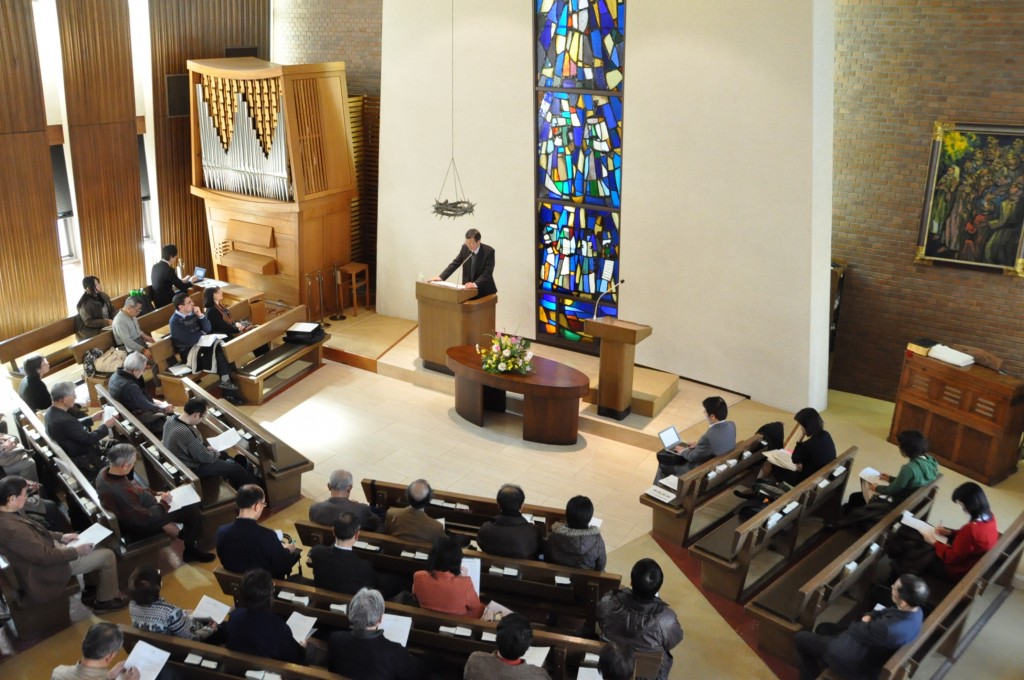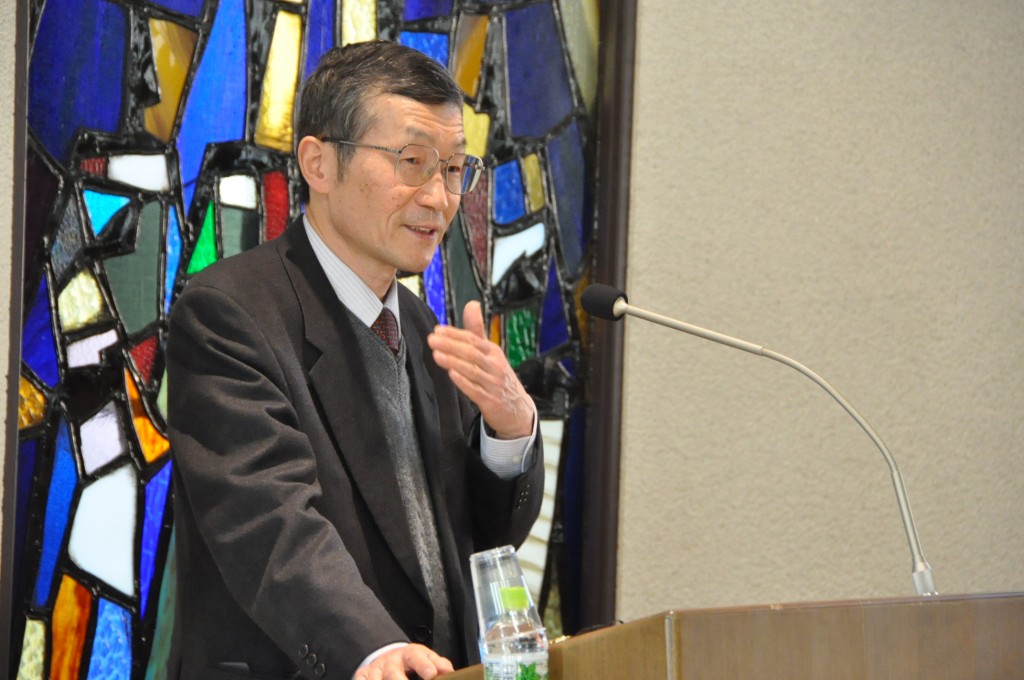Center for Interdisciplinary Study of Monotheistic Religions(CISMOR)Doshisha University
> Public Lectures > The Early Relations with the Middle East: Japan and the British Mandate PalestinePublic Lectures
Public Lecture by Project 1
The Early Relations with the Middle East: Japan and the British Mandate Palestine
| Date: |
2011/02/26 13:00 − 15:00 |
|---|---|
| Place: | Divinity Hall Chapel, Imadegawa Campus, Doshisha University |
| Lecture: | Kunio ISHIDA, Guest Professor, Nanzan University/ CISMOR Visiting Researcher |
| Summary: | |
|
Professor Ishida delivered a lecture on the relationship between Japan and the British Mandate for Palestine during the interwar period. Relations between Japan and the Middle East as known to the Japanese public are mostly limited to those after the fourth Middle East War and the oil crises, and no information or only fragmented information has been available regarding how Japan interacted with the Middle East before these incidents. In reality, however, the close political and economic relationship between Japan and Palestine dates back to the days immediately after the end of World War I. After World War I, Japan emerged as a new leader of Asia in international society and thus was under pressure to stabilize its relationships with Great Britain and the U.S. in order to establish its position as a world power. Under such circumstances, Japan paid attention to Jewish Zionists, who were beginning to increase their presence in international society led by the West after the war. Japan exploited the position of Zionists to keep stable its cooperative relationships with the West. At the end of 1918, Japan, following Italy, France, and the U.S., approved the Balfour Declaration issued by Great Britain. In light of the fact that Japan was the last world power to approve this declaration, as well as the timing of its approval, we may infer that Japan had an intention to align its stance toward the Jewish issue with Great Britain and the U.S. prior to the Paris Peace Conference. In fact, Japan endeavored to implement policy measures to keep friendly ties with Zionists throughout the 1920s. In those days, Palestine was in the process of modernization and transition to a market economy guided by the mandate government, Great Britain. The railway built by the British army for military purposes during World War I became the country’s important infrastructure for land transport, and sea access from the Mediterranean Sea was improved. The domestic population grew due to the inflow of Jewish immigrants, and the market was prospering. Against the backdrop of improved accessibility and a vigorous market, an increasing number of Japanese visited Palestine for pilgrimage and business. The contact point of the Japanese government with Palestine at that time was the Japanese consulate in Port Said near the Suez Canal. However, Japan’s understanding of the antagonism between Arabs and Jews in Palestine was far from being satisfactory—Japan first became aware of the serious and complex nature of the religious problem facing Palestine in 1929 when a clash between Arabs and Jews occurred in Jerusalem (the Wailing Wall incident). In the wake of this incident, the Japanese government recognized the importance of taking a third-party attitude to both Arabs and Jews and of maintaining amicable relations with Great Britain, the mandate government of Palestine. This recognition was at the core of the subsequent Middle East policy of Japan. After the occurrence of the Manchurian Incident in 1931, however, Japan became isolated from international society both politically and economically. In Palestine, as well, many of the Jewish citizens blamed the Japanese government for having caused the Manchurian Incident, but the economic relationship between Japan and Palestine enjoyed drastic development. In those days, Japan was facing political and economic difficulties, resulting from a sharp decline in exports due to the spread of protectionism following the Great Depression. In addition, Japan was driven out of the East Asian market after its withdrawal from the League of Nations. On the other hand, Palestine enjoyed phenomenal economic development/success and strong market demand despite the Great Depression, as a large European Jewish population moved to Palestine with their assets to flee from the danger posed by the rise of the Nazis and the anti-Semitic policies. In addition, Palestine did not impose discriminatory tariffs on Japan. As a result, Japanese products, especially cotton cloth, which were shut out of the Asian market, were dumped into the Palestinian market in bulk. While the world was fraught with crises in those days, this seemingly unmatched pair further deepened their economic interdependence. In this way, Palestine was taking on greater importance for Japan as an export market. In addition, Haifa in Palestine, with its modern port facilities, increased its presence as a hub of trade accessible from various parts of the Middle East. Against this backdrop, Japan thought it would serve the national interest to have an honorary consul general stationed in Haifa, and considered who would be best suited to this post to maximize the commercial benefit of Japan—a Jew, an Arab, or a person from a third-party country. The conclusion Japan reached was to appoint an Englishman or a person from a third-party country to be an honorary consul general, who could have significant political and economic influence over this area and maintain a neutral position between Arabs and Jews. Accordingly, the Japanese government requested that the British mandate government nominate a candidate for the post and in response to this request, in 1935, the British government introduced to Japan a man named Norman Jolly, a British businessman living in Haifa who was engaged in sea transportation services. For unknown reasons, however, no further progress was made regarding this project for the few years that followed. Probably, this may be because the violent clashes between Arabs and Jews that occurred in 1936 dealt a heavy blow to the Palestinian economy and caused Japanese exports to Palestine to decline. Another possible reason is that Japanese diplomatic policy leaned toward the Axis powers with the signing of the Anti-communist Pact with Germany and Italy in 1936. In 1938, there was a sudden change in the situation, and Japan opened its consulate general in Haifa with Jolly serving as an honorary consul general. In those days, the Japanese government was pressed to implement diplomatic measures to ward off the harsh criticism directed at it by Great Britain and the U.S. for having begun war against China in 1937, and the appointment of the Englishman to be an honorary consul general was, probably, one of the most important trump cards the Japanese government played to prevent the public opinion of Japan in Great Britain and the U.S. from being degraded. In hindsight, however, this message of Japan did not reach Great Britain and the U.S., and the world was plunged into World War II. In the workshop after the lecture, Professor Ishida gave supplementary information about international political situations centering on Japan and the Balfour Declaration, and a heated question-and-answer session was held involving the participants, including graduate students, concerning: the characteristics of Japan’s policy toward Palestine during the interwar period; the evaluation of the achievements of Chiune Sugihara; and anti-Semitism in Japan. Shunsuke Sugita (Research Assistant, Graduate Student of School of Theology, Doshisha University) |
|
|
Co-hosted by: School of Theology, Doshisha University *This lecture will be given in Japanese. *Admission Free, No Reservation Necessary. |
|
|
Program(Japanese) |
|

